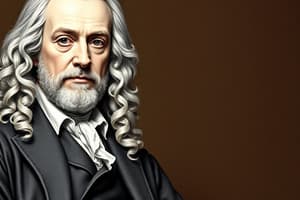Podcast
Questions and Answers
What was the primary belief at the center of the Enlightenment movement?
What was the primary belief at the center of the Enlightenment movement?
- Reason and logic can improve society (correct)
- Divine rights should govern rulers
- Fate determines human outcomes
- Tradition is the best guide for governance
Which philosopher is known for the concept of natural rights, including life, liberty, and property?
Which philosopher is known for the concept of natural rights, including life, liberty, and property?
- Voltaire
- Rousseau
- Montesquieu
- John Locke (correct)
What is the significance of Montesquieu's idea of separation of powers?
What is the significance of Montesquieu's idea of separation of powers?
- It encourages collaboration between branches
- It allows for unlimited government authority
- It promotes a government led by a single ruler
- It prevents any single group from becoming too powerful (correct)
Which influential figure is known for advocating reason, education, and civic involvement in America?
Which influential figure is known for advocating reason, education, and civic involvement in America?
What key document did Thomas Jefferson author that reflects Enlightenment principles?
What key document did Thomas Jefferson author that reflects Enlightenment principles?
Which ideology was fundamentally challenged during the Enlightenment?
Which ideology was fundamentally challenged during the Enlightenment?
How did Locke justify the right of citizens to revolt against their government?
How did Locke justify the right of citizens to revolt against their government?
Which Enlightenment concept is reflected in the system of checks and balances in the U.S. government?
Which Enlightenment concept is reflected in the system of checks and balances in the U.S. government?
What was a significant belief that motivated the American Revolution?
What was a significant belief that motivated the American Revolution?
Which principle was NOT established by the U.S. Constitution?
Which principle was NOT established by the U.S. Constitution?
Which slogan best reflects Enlightenment ideas during the American Revolution?
Which slogan best reflects Enlightenment ideas during the American Revolution?
How did the Enlightenment influence American society beyond its founding?
How did the Enlightenment influence American society beyond its founding?
What does the Bill of Rights primarily protect?
What does the Bill of Rights primarily protect?
Which of the following best describes the Enlightenment's impact on governance?
Which of the following best describes the Enlightenment's impact on governance?
What is a key feature of democracy that emerged from Enlightenment thought?
What is a key feature of democracy that emerged from Enlightenment thought?
What major struggle characterized the American Revolution, aside from independence?
What major struggle characterized the American Revolution, aside from independence?
Flashcards are hidden until you start studying
Study Notes
The Enlightenment: Overview
- An influential intellectual movement in the late 17th to 18th century, emphasizing reason, individual rights, and scientific inquiry.
- Promoted significant changes in politics, philosophy, and society, shaping modern Western thought.
Core Ideas of the Enlightenment
- Central belief in reason and logic to understand the world and improve society.
- Philosophers challenged traditional authority, particularly in government and religion.
- John Locke introduced the concept of natural rights: life, liberty, and property, advocating for governments to protect these rights.
- Locke argued for the right to revolt against governments that fail to uphold rights, inspiring American colonists' resistance to British rule.
- Montesquieu suggested the separation of powers within government to prevent any one group from gaining excessive power, influencing the U.S. governmental structure.
Influential Figures and Documents
- Benjamin Franklin, a key Enlightenment thinker, championed reason, education, and civic engagement.
- Thomas Jefferson, principal author of the Declaration of Independence, incorporated Enlightenment principles, declaring all men are created equal with unalienable rights.
- The Declaration affirmed that government derives its power from the consent of the governed, justifying the colonies' separation from British rule.
- The U.S. Constitution, guided by Enlightenment ideals, established a system of checks and balances, a separation of powers, and included a Bill of Rights to protect individual liberties.
The American Revolution
- The Enlightenment's influence was pivotal during the American Revolution (1775-1783), as colonists fought for their rights and freedoms.
- The phrase "No taxation without representation" captured the essence of Enlightenment thought against British taxation without consent.
- The Revolution represented a broader struggle to implement Enlightenment principles in governance, demonstrating the potential to challenge oppressive authorities.
Legacy and Impact
- The Enlightenment's impact persists beyond the U.S. founding, establishing principles of democracy, individual rights, and scientific inquiry.
- The Bill of Rights reflects the Enlightenment commitment to individual liberties and freedoms.
- Promoted a culture of questioning and critical thinking, vital in American education and public discourse.
- Emphasis on reason over tradition has spurred innovation and progress across various sectors, including science and social justice.
Conclusion
- The Enlightenment provided the intellectual foundation for the United States, emphasizing reason, natural rights, and government by consent.
- Its principles continue to influence American democracy and the ongoing pursuit of equality and justice.
Studying That Suits You
Use AI to generate personalized quizzes and flashcards to suit your learning preferences.




